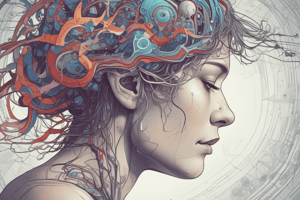Podcast
Questions and Answers
How does damage to the hippocampus affect cognitive functions?
How does damage to the hippocampus affect cognitive functions?
- Facilitates better attention
- Enhances learning capacity
- Improves memory retention
- Disrupts learning and memory (correct)
What emotional deficits may result from damage to the amygdala?
What emotional deficits may result from damage to the amygdala?
- Higher feelings of guilt for breaking rules
- Loss of control of emotions and difficulties recognizing fear (correct)
- Increased recognition of emotions
- Greater empathy towards others
What role does the thalamus play in the brain?
What role does the thalamus play in the brain?
- Stores long-term memories
- Regulates pain sensation
- Directs incoming sensory information to the cerebrum (correct)
- Facilitates emotional processing
Which of the following issues can arise from damage to the cingulate gyrus?
Which of the following issues can arise from damage to the cingulate gyrus?
In people with bipolar disorder, which brain structure is notably associated with the disorder?
In people with bipolar disorder, which brain structure is notably associated with the disorder?
How can damage to the hippocampus specifically impact patients with Parkinson’s disease?
How can damage to the hippocampus specifically impact patients with Parkinson’s disease?
What mental health condition is linked to structural changes in the anterior cingulate cortex?
What mental health condition is linked to structural changes in the anterior cingulate cortex?
Which function is associated with the basal ganglia in relation to cognitive and emotional behavior?
Which function is associated with the basal ganglia in relation to cognitive and emotional behavior?
Which statement best describes the physiological aspect of emotion?
Which statement best describes the physiological aspect of emotion?
What is a defining characteristic of fright disorder?
What is a defining characteristic of fright disorder?
Susto is predominantly associated with which type of symptoms?
Susto is predominantly associated with which type of symptoms?
How do cultural factors influence the experience of psychopathology?
How do cultural factors influence the experience of psychopathology?
The psychological and somatic symptoms attributed to the evil eye can lead to what kind of health outcomes?
The psychological and somatic symptoms attributed to the evil eye can lead to what kind of health outcomes?
What is the role of the amygdala in the brain?
What is the role of the amygdala in the brain?
What mental health conditions are linked to damage in the hypothalamus?
What mental health conditions are linked to damage in the hypothalamus?
Which gene is characterized by the necessity of pairing with another recessive gene to determine a trait?
Which gene is characterized by the necessity of pairing with another recessive gene to determine a trait?
Which neurotransmitter is primarily associated with excitatory functions in the nervous system?
Which neurotransmitter is primarily associated with excitatory functions in the nervous system?
What does the diathesis-stress model suggest about psychological disorders?
What does the diathesis-stress model suggest about psychological disorders?
Which part of the brain is primarily responsible for managing working memory and cognitive control?
Which part of the brain is primarily responsible for managing working memory and cognitive control?
Which neurotransmitter is known for its role in mood regulation and is commonly affected by antidepressants?
Which neurotransmitter is known for its role in mood regulation and is commonly affected by antidepressants?
What impact can overactivity of glutamate have on the nervous system?
What impact can overactivity of glutamate have on the nervous system?
How do genes contribute to the heritability of cognitive abilities according to the studies mentioned?
How do genes contribute to the heritability of cognitive abilities according to the studies mentioned?
What is a primary function of dopamine in the brain?
What is a primary function of dopamine in the brain?
What is a dominant gene's role in influencing traits?
What is a dominant gene's role in influencing traits?
What do environmental factors contribute to according to the genetic studies?
What do environmental factors contribute to according to the genetic studies?
Which neurotransmitter is primarily inhibitory and helps to calm the nervous system?
Which neurotransmitter is primarily inhibitory and helps to calm the nervous system?
What are the effects of chronic stress on the hypothalamus?
What are the effects of chronic stress on the hypothalamus?
What role does the limbic system play in emotional regulation?
What role does the limbic system play in emotional regulation?
Which neurotransmitter is linked to both schizophrenia and addiction disorders?
Which neurotransmitter is linked to both schizophrenia and addiction disorders?
What is an example of modeling or observational learning?
What is an example of modeling or observational learning?
What does Aaron Beck's triad explain in relation to depression?
What does Aaron Beck's triad explain in relation to depression?
What is learned helplessness characterized by?
What is learned helplessness characterized by?
How does prepared learning contribute to survival?
How does prepared learning contribute to survival?
What is toxic positivity?
What is toxic positivity?
What physiological response is associated with the fight or flight response?
What physiological response is associated with the fight or flight response?
What is the definition of mood in psychological terms?
What is the definition of mood in psychological terms?
What role does affect play in emotions?
What role does affect play in emotions?
Flashcards are hidden until you start studying
Study Notes
Cognitive Aspects of Emotion
- Emotional experiences are influenced by appraisals and attributions, essential for processing surroundings.
Physiology of Emotion
- Emotion functions primarily in the brain, especially within primitive areas like the limbic system.
Cultural, Social, and Interpersonal Factors
- Fear manifestations can include voodoo and the evil eye; these influences contribute to different emotional experiences.
Fright Disorder
- Characterized by exaggerated startle responses along with observable fear and anxiety reactions.
- Not enough prevalence for inclusion in DSM-5-TR.
Susto
- Commonly seen in Latin American cultures, associated with anxiety-based symptoms, insomnia, irritability, and phobias.
- Somatic symptoms may include sweating and tachycardia; perceived as being victimized by black magic.
Evil Eye
- Involves psychological and somatic symptoms; the resulting fright disorder can be fatal.
Haitian Phenomenon of Voodoo Death
- Introduced in Cannon's 1942 work showing how emotional distress may lead to death.
Gender and Psychopathology
- Gender roles strongly influence the manifestation of mental disorders, although gender itself does not cause psychopathology.
Integrative Approach to Psychopathology
- Emphasizes a multidimensional model including behavioral, biological, emotional, social, and developmental influences.
Genetic Contribution to Psychopathology
- Genes are located on 46 chromosomes, with 23 pairs influencing the development of the body and brain.
- Dominant genes strongly influence traits; recessive genes require a pair to manifest a trait.
Heritability Studies
- Twin studies show cognitive abilities’ heritability estimates range from 32% to 62%.
- Genetics maintain stability in cognitive abilities through adulthood, while environment accounts for changes.
Diathesis-Stress Model
- Individuals have inherited tendencies that are activated under stress, creating susceptibility to disorders.
Gene-Environment Correlation Model
- People may create environments leading to triggers that activate genetic vulnerabilities.
Neuroscience and Psychopathology
- The frontal lobe manages voluntary movement, expressive language, and executive functions; its pre-frontal cortex segments correspond to different cognitive tasks.
- The limbic system regulates instinctive behaviors; the amygdala is crucial for emotion processing.
Amygdala’s Role
- Damage can lead to aggression, emotional control issues, and difficulties in fear recognition.
- Childhood violence linked to reduced amygdala volume relates to stress and depression.
Hippocampus
- Integral for memory; damage impairs learning, navigation, and can lead to dementia symptoms.
Thalamus
- Routes sensory information to the cerebrum.
Cingulate Gyrus
- Regulates emotions and pain; damage results in inappropriate emotions and impaired learning ability.
Basal Ganglia
- Governs cognitive and emotional behaviors, reinforcement, and can contribute to disorders like depression and movement issues.
Hypothalamus
- Regulates eating, drinking, and basic emotions; its dysfunction links to conditions like anxiety and depression.
Major Neurotransmitters
- Glutamate is an excitatory transmitter; excessive activation can harm the nervous system.
- GABA, an inhibitory neurotransmitter, helps to calm and regulate emotional responses.
- Serotonin influences mood and behavior; related to disorders like depression and bipolar disorder.
- Norepinephrine affects heart rate and blood pressure; associated with stress responses.
- Dopamine influences pleasure and motivation, crucial in addiction and schizophrenia.
Behavioral and Cognitive Science
- Cognitive science studies information processing, storage, and retrieval, impacting emotional development.
Learned Helplessness and Optimism
- Learned helplessness arises from uncontrollable conditions; optimism can counteract stress, but excess positivity may be detrimental.
Modeling and Observational Learning
- Involves learning from others' experiences through symbolic integration.
Prepared Learning
- Certain stimuli are evolutionarily predisposed for learning due to their survival importance.
Implicit Memory
- Influences behavior based on past experiences, often outside of conscious awareness.
Importance of Fear
- Darwin highlighted fear as an evolutionary function, contributing to survival through the fight-or-flight response.
Mood and Affect
- Mood reflects prolonged emotional states; affect pertains to the inherent positivity or negativity of emotions.
Components of Emotion
- Emotional behaviors communicate through basic patterns, such as freeze, escape, or attack.
Studying That Suits You
Use AI to generate personalized quizzes and flashcards to suit your learning preferences.




